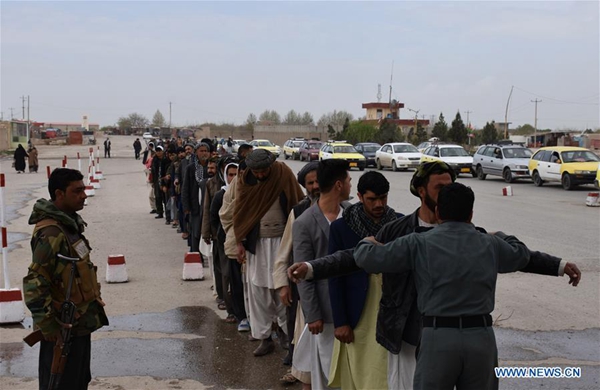Peace in Afghanistan is near
- By Sajjad Malik
 0 Comment(s)
0 Comment(s) Print
Print E-mail China.org.cn, March 21, 2019
E-mail China.org.cn, March 21, 2019

The latest round of talks between the United States and the Taliban has produced tangible results and all signs indicate that the two sides are now closer than ever before ending the deadly conflict that has spanned over 17 years.
The talks started last month in the Qatari capital of Doha and went on for more than two weeks. U.S. chief negotiator Zalmay Khalilzad announced after the talks that both sides had agreed on a draft agreement on the withdrawal of troops from Afghanistan as well as the implementation of counter-terrorism measures.
This is a huge achievement especially when compared to the situation a while back when both sides were not even ready to negotiate, and when the idea of peace between the U.S. and the Taliban looked more like a pipe dream.
But time has changed and with it too, the attitude of both adversaries.
Despite the big leap forward in talks, there is still some ways to go. Ambassador Khalilzad was right when he declared that there was agreement on the two key issues, but he also added that there were two other matters that needed to be tackled before a full resolution could be achieved.
One of the unresolved issues is how to bring the different Afghan factions together for an intra-Afghan dialogue. Though the Taliban and the current Afghan government are the main parties in the conflict, other stakeholders should also be brought on board.
Afghanistan is a complex and multi-faceted society and the leading tribes, local chiefs and other important leaders would also like to be consulted. It may not be possible to include everyone in discussions, but a mechanism should be created to make the process as inclusive as possible.
The second key issue, which needs to be addressed to create lasting peace, is how to arrange a comprehensive ceasefire. This is tricky because until all groups endorse the final agreement, complete peace cannot be achieved.
Since the U.S. and Taliban have already agreed to take steps to end the conflict, talks should immediately start for an intra-Afghan dialogue and ceasefire. Until there is progress on these two issues, political uncertainty will not go away.
If the past can be a guide, we can say that local rivalries have been the main hurdle in bringing lasting peace in Afghanistan. Looking back, it seems easier for Afghans to unite and fight a foreign enemy than to come together for a domestic political agenda.
After the USSR pulled out its troops in 1989, there was a golden opportunity for peace, but internal strife beset the former allies. The subsequent years saw the the nation descend into chaos, which was later characterized by shifting loyalties.
The emergence of the Taliban as a strong force in 1990s also failed to end the problem and the country was painfully divided. The unrest continued until 9/11, which changed the course of Afghan history.
Since NATO troops under American leadership toppled the Taliban government, Afghans have hardly witnessed a day of calm. For all intents and purposes, it seemed like the Afghan war was a fight between militants and foreign forces, but in reality Afghans were also fighting each other.
It's good that the Taliban has reached some agreement with the Americans, but it remains to be seen if they can show the same spirit when dealing with fellow Afghans. This same rule applies to the Afghan government and other groups, they seem ready to work with foreign forces but can they truly accommodate Taliban?
Let us hope that Afghans now better understand global politics and the unfortunate price they paid of being caught in the middle. Let's also hope that they will avoid bickering and petty politics, which will only delay the attainment of lasting peace.
The people of Afghanistan deserve a safe and prosperous future, but they must know that this will only come through foresight, mutual tolerance, and open-mindedness.
Another key point is that the reconstruction of Afghanistan should also be on the agenda. Massive resources and efforts are needed to transform the war-torn country into a normal economy and functional polity.
The final draft should include international commitments to rebuilding Afghanistan, and all those countries which were directly or indirectly involved in Afghanistan since the 1970s should contribute financially to put it back on its rightful path of peace and progress.
Sajjad Malik is a columnist with China.org.cn. For more information please visit:
http://www.china.org.cn/opinion/SajjadMalik.htm
Opinion articles reflect the views of their authors, not necessarily those of China.org.cn.
If you would like to contribute and have specific expertise, please contact us at opinion@china.org.cn.






Go to Forum >>0 Comment(s)